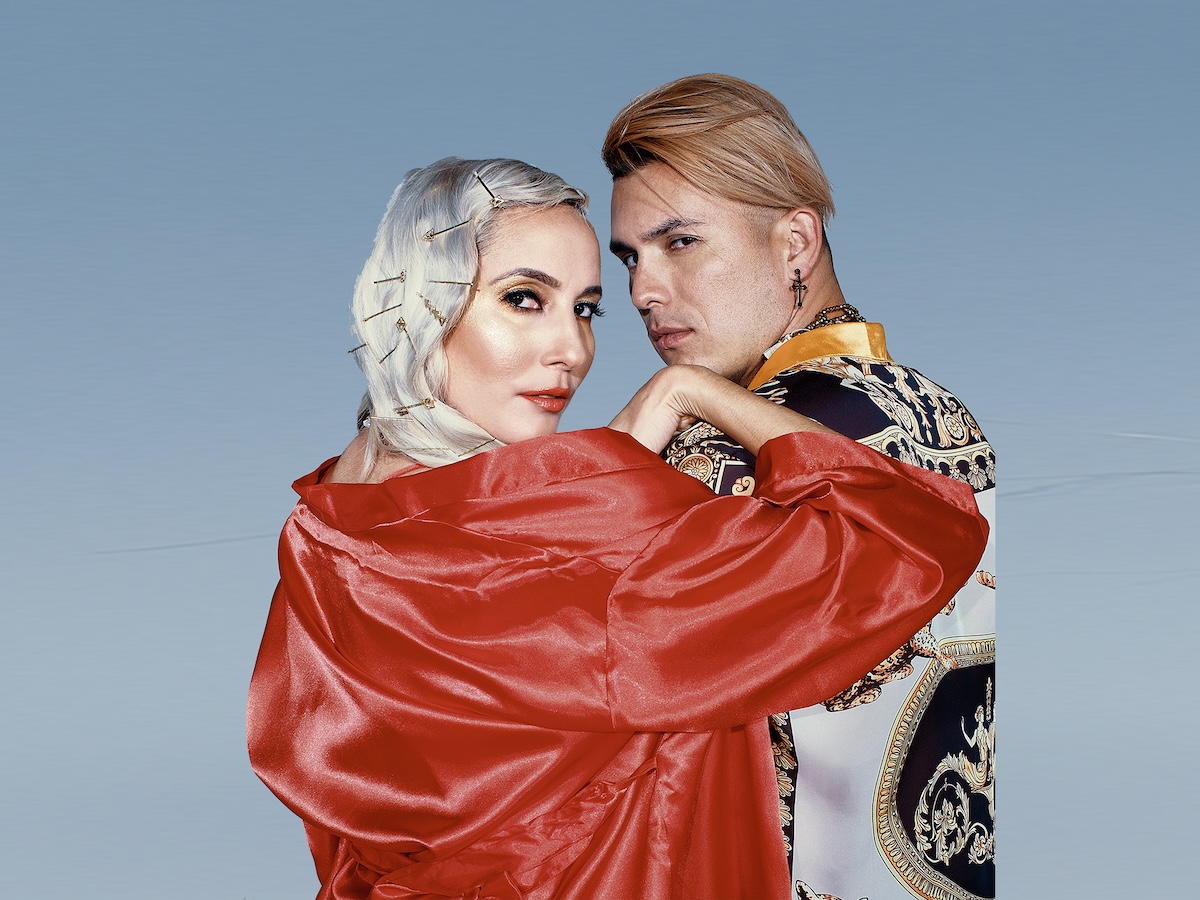
Domino Saints Press Photo

Audio By Carbonatix
Domino Saints didn’t leave a major label because they failed. They left because they’d already succeeded—and wanted more than a seat at the table. Gigi Ojeda and David Leal had Billboard hits, international tours, and the kind of glossy support structure most emerging artists dream of. But the more they thrived, the more boxed in they felt.
“Imagine someone telling a painter they can only use red,” Ojeda says. That’s how the Miami-based duo describes life inside a major label: a creative straitjacket with an excellent marketing budget. So they did what few artists dare — they walked away, betting on independence before it was cool.
Their first test came fast. They launched a boutique label, Rebel Eleven, and dropped “Ya Quiero” in 2017. The single shot to No. 1 on Billboard’s Tropical chart, proof that creative risk could pay off without corporate backing. From that moment, Domino Saints became the case study for how to rebuild a career on your own terms.
Freedom came with a price. “We had to learn everything,” Leal says. “Taxes, contracts, accounting… we became our own label, our own business managers.” Mistakes were inevitable — missed deductions, bad deals, overpayments — but so were the lessons. Independence forced them to understand every layer of their profession.
Instead of releasing music once a year, they built a production pipeline: write, record, produce, shoot, release, and repeat. “The industry still moves like it’s the 1990s,” Ojeda says. “But today, the audience scrolls. If you wait too long, they move on.” Domino Saints adapted to the algorithmic rhythm without losing artistic soul.
They also discovered a new kind of financing model: brand collaborations that double as art. When the pandemic hit, they wrote tracks for a video game — and “Bulla” ended up in EA Sports’ FIFA 21, exploding their audience across continents. That visibility led to a Mastercard partnership that turned them into global creative ambassadors, winning the Music + Sound Award for Best Artist + Brand Collaboration.
“We don’t do jingles,” Ojeda laughs. “We make songs that live in both worlds, the brand’s message and our artistic DNA.”
Budget constraints also pushed the duo into filmmaking. When Miami video crews quoted prices that would bankrupt most indie acts, Domino Saints bought a drone and a small camera, then flew to Paris. They shot a video at sunrise in front of the Eiffel Tower, just the two of them. The final result looked like a million-dollar production. “It’s about creativity, not equipment,” Leal says.
Their music videos, often conceptual and cinematic, have become an integral part of their brand: modern, bold, and unapologetically visual. “People don’t just want to hear what you felt,” Ojeda explains. “They want to see it.”
Behind the glamor lies relentless discipline. Domino Saints run their company like a startup: registering copyrights, protecting masters, negotiating deals, and reinvesting profits into visuals and touring. “Artists need to know how to do business,” Ojeda insists. “Own your masters, get a good lawyer, and understand where your money comes from.”
They warn against the myth of overnight virality. “Everybody wants to go viral,” Leal says, “but you might be giving away your ideas for free. Protect your work. The song you post today could become someone else’s hit tomorrow.”
For Domino Saints, Miami is their creative hub. The city’s hybrid pulse of Latin, Afro-Caribbean, and electronic music makes it fertile ground for independent talent. “Miami is a living network,” Ojeda says. “You can meet a producer at a bar in Wynwood, a director at a café in Little Havana, or a tour manager at a random pop-up show. The connections are real if you show up.”
Leal adds, “You can’t stay locked in the studio waiting for things to happen. Go out. Talk to people. That’s how half our projects start.”
Now the duo is ready for their next chapter. On October 15, they released Vida Rosa (Side A), the first of two EPs dedicated to what they call “La Vida Rosa” — a life that embraces joy, resilience, and the art of facing every challenge with positive energy. The four-track project marks a collaboration with BMG Production Music, created specifically for television and sync. Written and produced entirely by Ojeda and Leal, and mixed and mastered alongside Gotex the Lyon and Jonnie Dave, the EP blends high-energy Latin pop with sleek electronic textures and the duo’s signature bilingual chemistry.
The tracklist includes “El Coro,” “Fichu Baby,” “Sinergia” — the focus track — and “Vida Rosa.” “Vida Rosa (Side A) is a four-track burst of high-energy Latin pop from Domino Saints, fusing electronic flair with traditional grooves and Spanish vocals shared between Gigi Ojeda and David Leal,” says Brad Marripondi of BMG Production Music. “Anchored by the standout single Sinergia, the EP pulses with danceable beats, shimmering synth textures, and rich Latin instrumentation, perfect both for the club and for anyone looking to feel alive again.”
Asked what advice they’d give Miami’s new generation of artists, Ojeda doesn’t hesitate. “Discipline,” she says. “Creativity means nothing without consistency.” Leal adds, “Build your tribe. You need people who believe in your vision, producers, videographers, designers, everyone growing together.”
They both stress the importance of knowing your worth. “Don’t give away your rights just to be seen,” Ojeda warns. “And don’t depend on one stream of income. Syncs, brand deals, live shows, they all count.” Leal laughs: “And learn everything, contracts, marketing, cameras, taxes. The more you know, the less you have to wait for someone else.”
Ultimately, both agree that Miami rewards visibility. “Be out there,” Ojeda says. “Go to the shows, the mixers, the street fairs. You never know who’s sitting next to you. Every connection counts.”